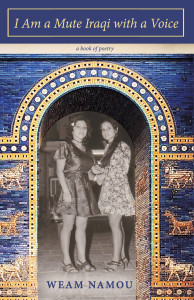When I had my first child nine years ago, I thought I would have to give up writing until she started preschool. I had by then written three novels and, given the demands of motherhood, I knew I could not easily formulate on paper a dozen sentences, let alone a 300 page manuscript.
Then one day, while my daughter was taking her nap, I sat on the couch with a pen and paper and wrote a story through a poem. This was not my first poem. I wrote my first poem in 2001 when I attended the Prague Summer Seminar that was sponsored by the University of New Orleans. Before that, poetry was as foreign to me as Baghdad is to westerners.
Studying a new form of writing in such a structurally beautiful and strikingly colorful city proved to be quite natural. I would grab a coffee and croissant every morning from a local café, head to Charles University, founded in 1348, and sit in a classroom taught by American poet Anne Marie Macari.
I listened to poetry readings by the late, renowned Czech author Arnost Lustig and Pulitzer Prize winner Philip Levine. I enjoyed plenty of goulash, strolls down Charles Bridge, and walks on park trails lined with pear trees. The experience in Prague filled me with a love for poetry, but I did not start writing poems again until six years later, when I became a mother.
My creativity found an outlet through this language and my soul collected joy as I placed literature on paper in between cooking a curry stew or while cartoons held my children’s attention. Within a poem, I discovered I could share an intimacy with literature without the pressure and length of time that a novel required.
It was like enjoying a meal with a loved one. You give those moments your time and energy and then each one goes their separate way. With a novel, you feel attached at the hip for a year or two. Over the next ten years, I managed to return to writing 300-plus-page manuscripts, memoirs this time. But my love for poetry has always remained.
I believe it was always in me, it was in my genes. When I read about my ancestors, the ancient Mesopotamians, who invented writing, the image of Enheduanna always comes to mind. Enheduanna is the world’s first recorded writer.
She was the daughter of the great Mesopotamian king Sargon of Akkad and the high priestess of the temple of Nanna, the Akkadian moon god, in the center of her father’s empire, the city state of Ur. She had a considerable political and religious role in Ur.
She wrote during the rise of the agricultural civilization when gathering territory and wealth, warfare, and patriarchy were making their marks. She offers a first-person perspective on the last times women in western society held religious and civil power. After her father’s death, the new ruler of Ur removed her from her position as high priestess.
I Am a Mute Iraqi with a Voice Description:
“Sometimes, a book of poems transcends the form and becomes pure experience. I Am a Mute Iraqi with a Voice is a startling call to memory and mourning for an Iraq that is “dead,” an ululation for all that is lost in war after war after war. In these poems, Iraqis are divided not by politics but by location and circumstance; those fortunate enough to live in America are wracked with guilt, and those left behind are trapped indoors. Namou interrogates this split within herself, with poem after poem an attempt to reconcile memories of a life in Baghdad with the safety of suburban American life and see past the divisions of history to an impossibly fraught future. I Am a Mute Iraqi is a troubling, necessary collection of poems urging us to recognize, and never forget, the personal and cultural consequences of war.”
– Trish Harris, founding editor of the Pea River Journal



